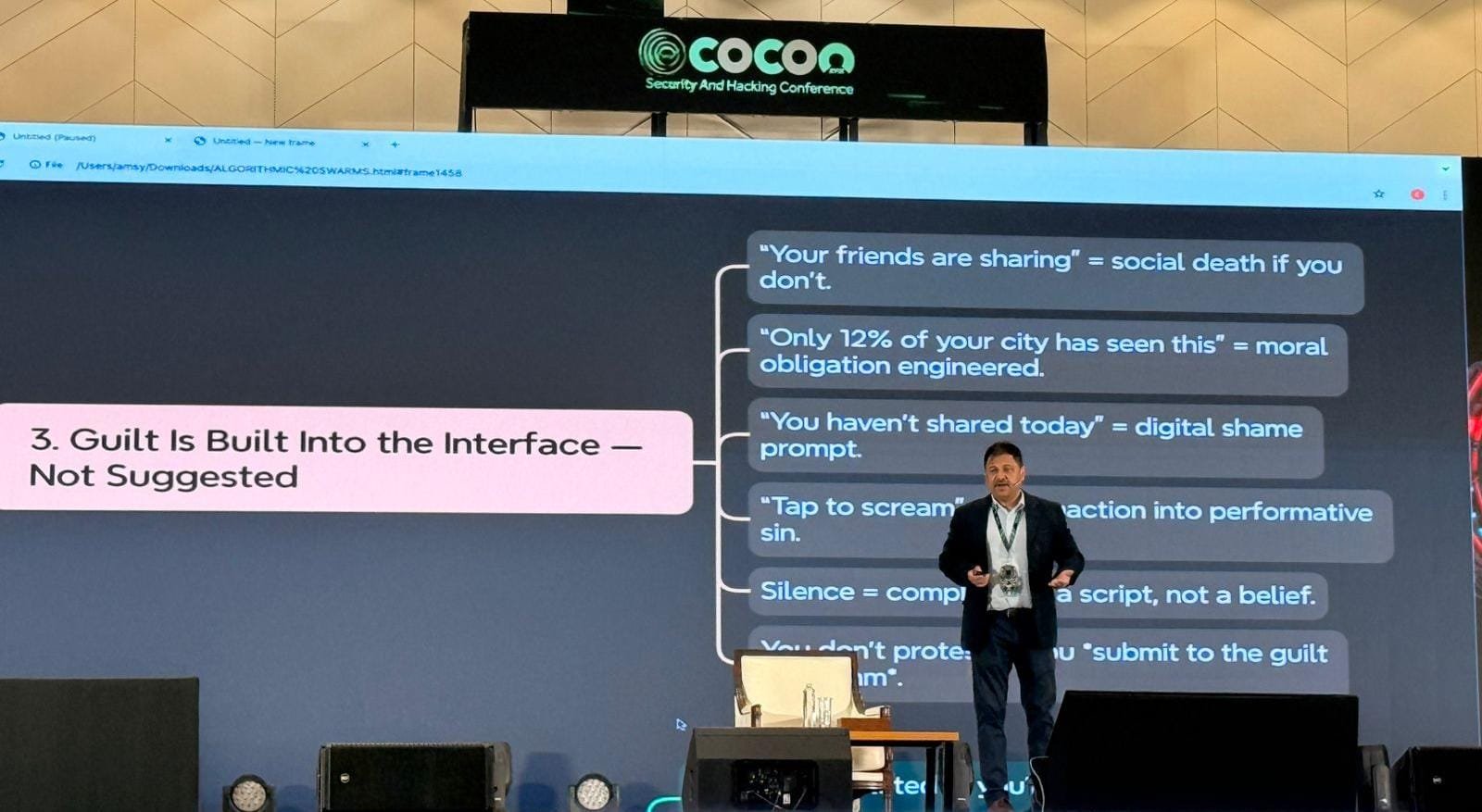Kochi, Kerala: At the second day of c0c0n 2025, one of Asia’s leading cybersecurity and digital policy conferences, Brijesh Singh, Principal Secretary at the Directorate General of Information and Public Relations, Maharashtra, delivered a thought-provoking address on the hidden power of social media algorithms in shaping human behavior, collective emotion, and civil unrest.
Speaking on the topic “Algorithmic Anarchy: Decoding Nepal Protests and the Role of Social Media Platforms,” Singh warned that algorithms today function as “faceless sovereigns,” capable of manipulating human emotion, fueling chaos, and undermining democratic institutions.
“Empathy is being weaponised on social media because it sells. You are no longer a citizen — you are an emotional target. Platforms profit from chaos even when you lose,” Singh said, drawing attention to how digital outrage has become a monetized commodity.
How algorithms turn users into mobs
Explaining the psychological mechanism behind online radicalization, Singh introduced the concept of “neuromodulation” — the process through which social media stimuli alter emotional states and behavior.
“Peaceful individuals, sitting behind laptops, can become part of angry mobs online. These platforms are engineered for emotional virality — they want you to like, share, and think emotionally,” he said.
FCRF Launches CCLP Program to Train India’s Next Generation of Cyber Law Practitioners
He cited the recent Nepal protests as an example of how leaderless digital movements can emerge and vanish with a single viral post.
“The protests began with one video and exploded overnight, only to disappear just as suddenly. The system amplifies anger and guilt — that’s how it keeps people engaged,” he noted.
According to Singh, the architecture of social platforms rewards outrage over reason. “Echo chambers are like solitary confinement cells, customized for each user,” he added. “The moment virality hits, rational thought collapses — and the algorithm takes over.”
Algorithms thrive on anger — and there’s no off switch
Singh said that social media systems have created a new form of power — algorithmic sovereignty — where decisions about what people see, feel, and believe are made by unseen digital forces.
“The algorithm is the first sovereign that rules without a face. It thrives on anger, hate, and division — and there is no off switch, only deepened dependence,” he cautioned.
Even internet shutdowns, he warned, are no longer effective. “During the Nepal protests, people used QR codes and offline apps to communicate. Even if the internet is switched off, there are cheap and accessible ways to keep the chaos alive,” he said.
Platforms profit from disorder, users bear the cost
Singh argued that the business models of social media platforms are inherently designed to amplify conflict because outrage drives engagement, and engagement drives revenue.
“Every time there’s a riot or protest, the platform profits. They own your data, your emotional triggers, and your time,” he said.
He noted that while the United States enjoys full access to social media data during investigations, Indian law enforcement agencies still face severe limitations.
“In the U.S., authorities can access data to investigate. Here, our agencies are denied that privilege — even when national security is at stake,” Singh said, urging for greater regulatory parity.
India’s new accountability framework
Referring to India’s evolving digital regulations, Singh welcomed new IT rules that make social media companies accountable for user-generated content.
“Under India’s new framework, platforms can no longer claim immunity. They will be held responsible for content that fuels harm or chaos,” he said.
He called for a global dialogue between governments, civil society, and technology platforms to ensure that “the architecture of the internet serves democracy, not dismantles it.”
“Algorithms today decide what we see, what we believe, and how we feel. They can even turn democratically elected governments into targets. It’s time we talk to these platforms — before they rewrite the rules of society itself,” he concluded, drawing a standing ovation from the audience.
c0c0n 2025: Where technology meets governance
Held in Kochi from October 7–11, 2025, c0c0n brings together policymakers, law enforcement, researchers, and cybersecurity professionals from around the world to discuss evolving digital threats. Organized by the Kerala Police and Information Security Research Association (ISRA), the event features sessions on AI-driven manipulation, critical infrastructure defence, digital forensics, and data privacy frameworks.
Singh’s session, one of the most talked-about at the conference, left delegates reflecting on a profound warning: the greatest threat to democracy may not come from hackers or spies, but from the code that shapes how we think and feel.



